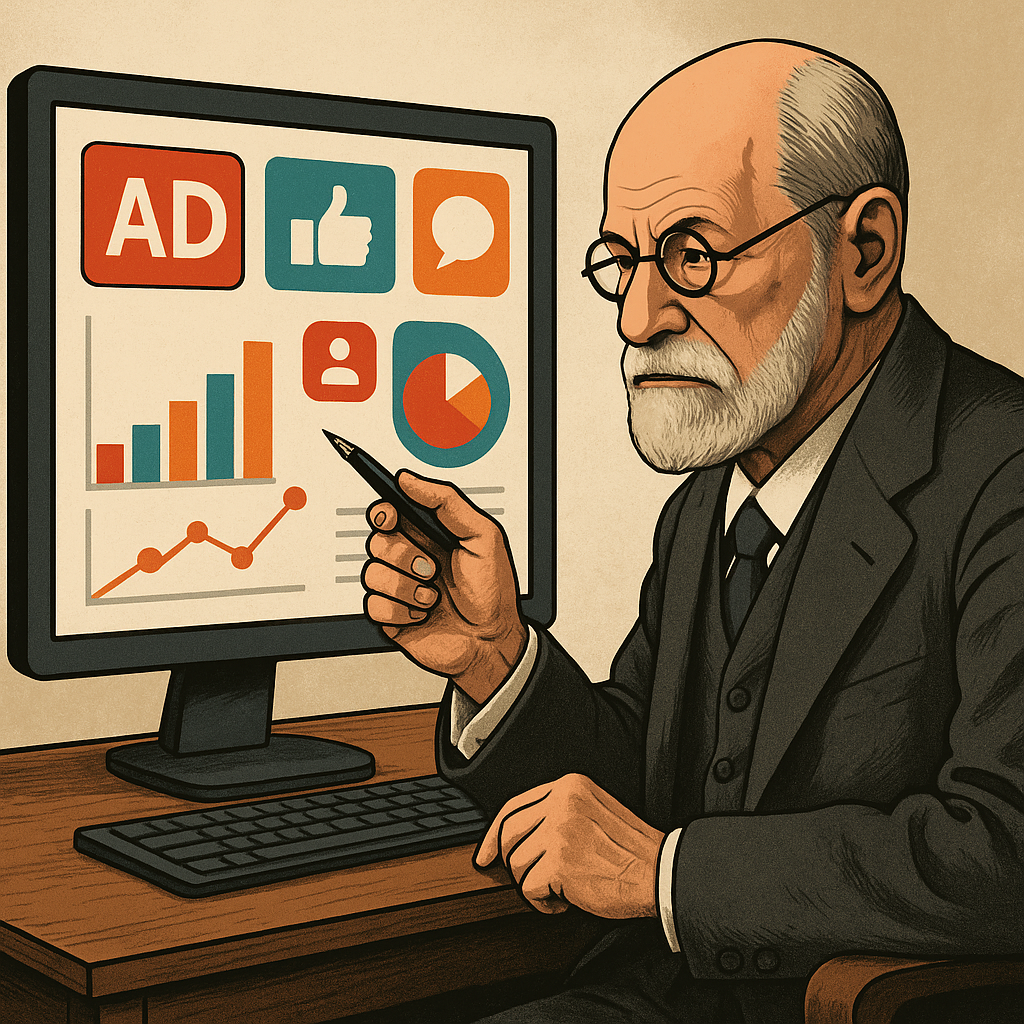
Introduction
Sigmund Freud, the father of psychoanalysis, dedicated his life to exploring the human mind, unconscious desires and the mechanisms that motivate our decisions. Although he lived in the late 19th and early 20th centuries, his ideas about human behavior and repressed desires are still relevant today, especially in the world of digital marketing.
In this article, we will explore how Freud's theories can be applied to modern digital marketing. While Freud never knew the digital world, his principles about unconscious desires, libido and emotional motivations could offer a unique perspective on how companies can connect with consumers more effectively.
Join us to discover how Freudian ideas can influence advertising campaign design, branding and digital marketing strategies.
Table of Contents
The unconscious and digital marketing: attracting unspoken desires
What it is: According to Freud, much of our behavior is guided by unconscious desires. Consumers do not always make decisions rationally, but are often influenced by emotional and instinctive factors.
Application to marketing: Digital marketing plays on these hidden desires through strategies that appeal to consumers' emotions, such as urgency, fear of missing out (FOMO) or the desire to belong to a group.
Example: Personalized advertising campaigns on platforms such as Facebook or Instagram, which leverage data on users' past behaviors, appeal to their deepest and often unconscious desires.
Libido and attractive branding
What it is: Freud postulated that the libido, or psychic energy, is linked to the sex drive and motivates many of our actions. For Freud, our decisions are not always based on what we need, but on what we desire.
Application to marketing: In digital marketing, libido can be understood as the emotional energy that consumers assign to brands. Companies must appeal to that emotional energy by offering something that satisfies consumers' deep desires, whether through status, pleasure or belonging.
Example: Brands like Apple or Nike don't just sell products; they sell a lifestyle, a feeling of exclusivity and a desire to belong to an elite group, which connects directly to consumers' libidinal impulses.
And, as we mentioned in our article on Five growth marketing tips for agencies and freelancers At ClickPanda, marketing strategies must be thought deeply into the consumer's desires and emotions. Recommendations on how to connect with customers more authentically and effectively, along with the use of appropriate segmentation tools, can further enhance the psychological principles that Freud developed.
You can read more about how to improve your marketing strategies in this related blog: Five growth marketing tips for agencies and freelancers.
The superego and morality in advertising campaigns
What it is: Freud divided the human psyche into three parts: the Ego, the Ego and the Superego. The superego represents the morality, values and norms that we internalize.
Application to marketing: Brands can play with consumers' superego by appealing to their values and beliefs. Marketing campaigns that promote social responsibility, sustainability or ethical commitment appeal directly to this part of the human psyche.
Example: Campaigns by brands such as Ben & Jerry's or Patagonia, which promote social and environmental causes, appeal to consumers' superego, urging them to make purchasing decisions aligned with their ethical values.
Repression and the influence of subliminal marketing
What it is: Freud stated that many of our emotions and desires are repressed and that the unconscious tries to suppress certain thoughts and memories. However, these repressed desires can manifest themselves through behaviors and decisions.
Application to marketing: Subliminal marketing plays on repressed or unconscious desires. While advertisements are not always perceived directly, subliminal messages can influence purchasing decisions without the consumer being aware of it.
Example: The use of specific colors, sounds or images in advertisements that evoke feelings or emotional impulses in consumers can be a form of subliminal marketing. For example, advertisements for luxury products may be designed to make consumers associate the product with success and social status.
Regression: connecting with the consumer on a primitive level
What it is: Freud described regression as a return to an earlier state of development in times of stress or anxiety. In marketing terms, this can be leveraged to connect with consumers on a primitive or emotional level.
Application to marketing: Brands that appeal to the most basic emotions, such as safety, affection or protection, can cause an emotional regression in the consumer. This can make the consumer feel more comfortable and familiar with the brand, which can increase loyalty.
Example: Brands that use familiar images, warm colors or emotional stories in their advertising campaigns seek to create a deep emotional connection, returning to the more primal feelings of security and trust.
Would you like to leverage psychological principles to create more effective digital marketing campaigns? ClickPanda helps you create personalized marketing strategies that connect with your customers on a deep, emotional level.
Conclusion:
Freud may not have known the world of digital marketing, but his theories on the unconscious, libido, superego and regression are incredibly relevant when it comes to understanding how consumers make decisions. By applying these psychological concepts to digital marketing, brands can create more effective and emotionally resonant campaigns, achieving a deeper connection with users.








